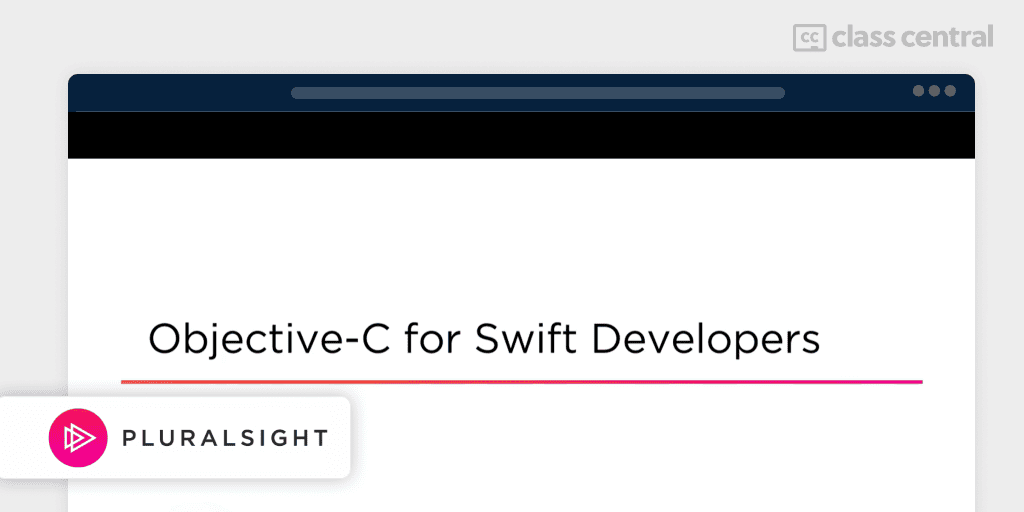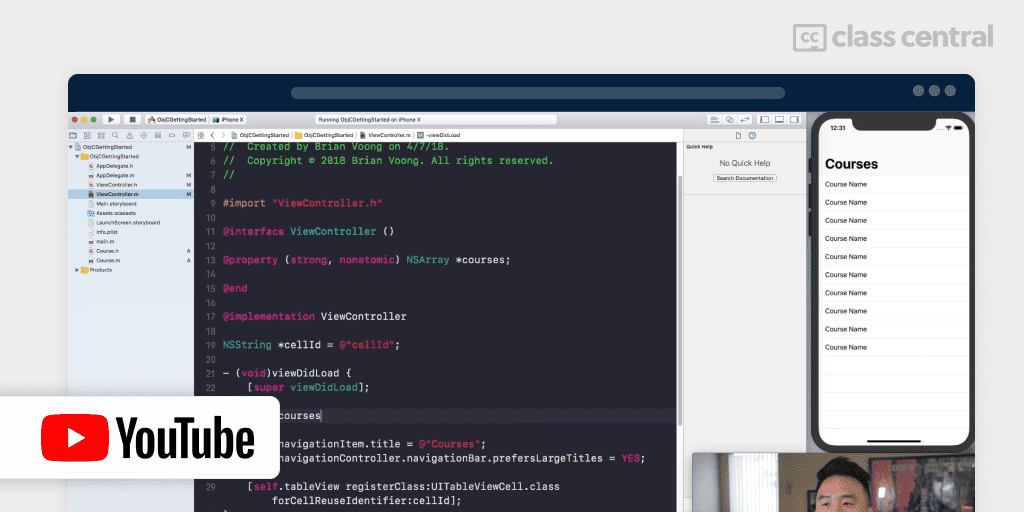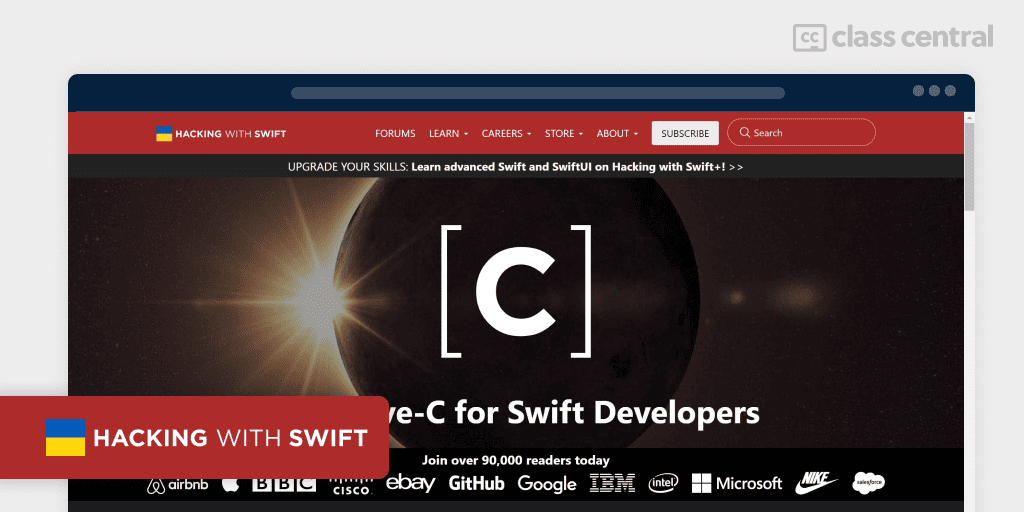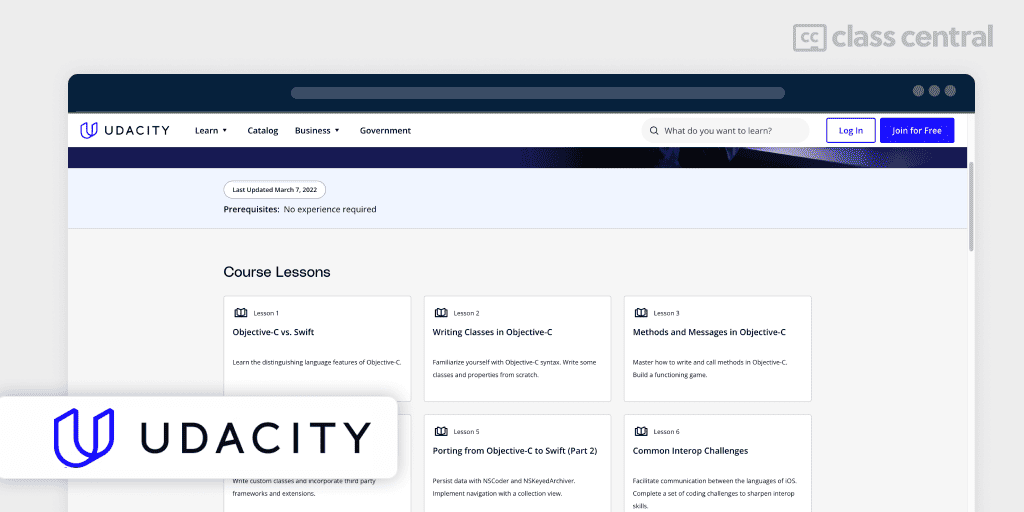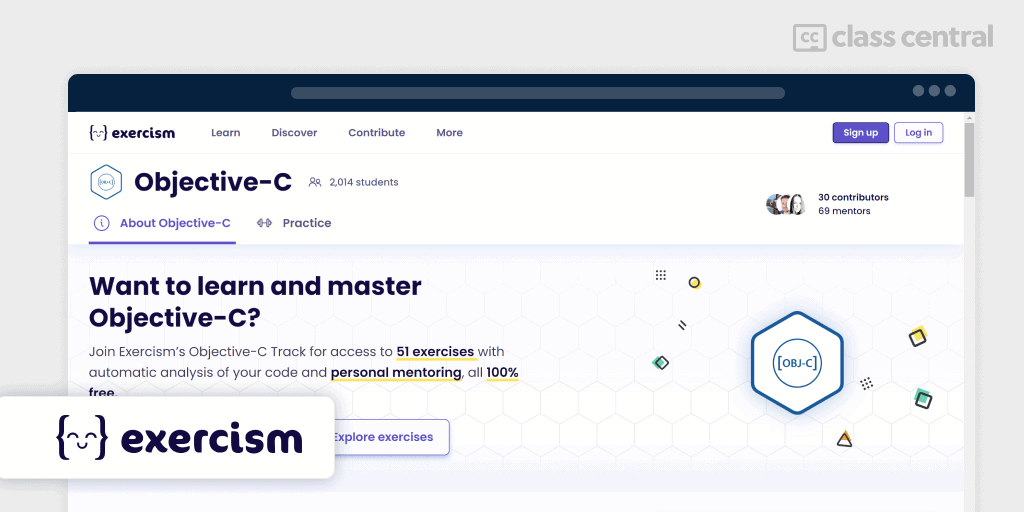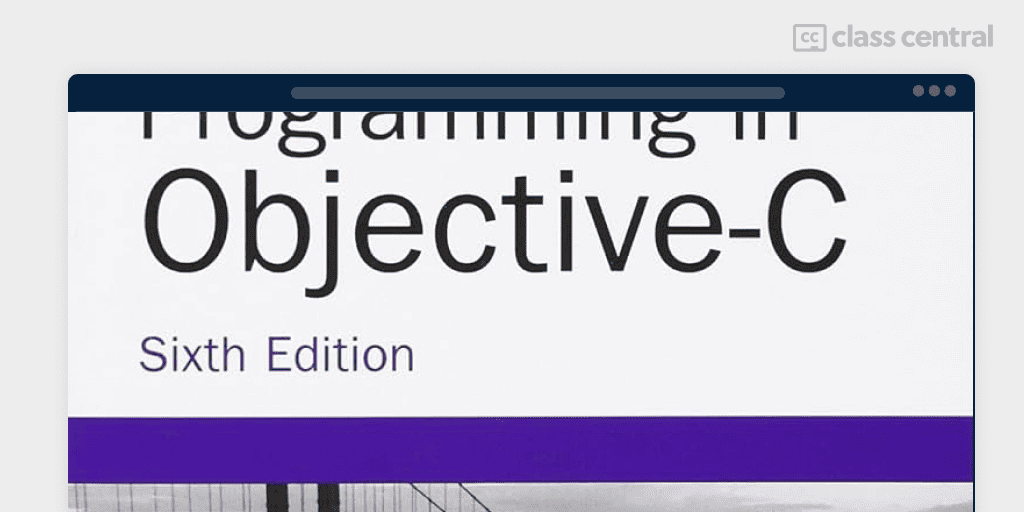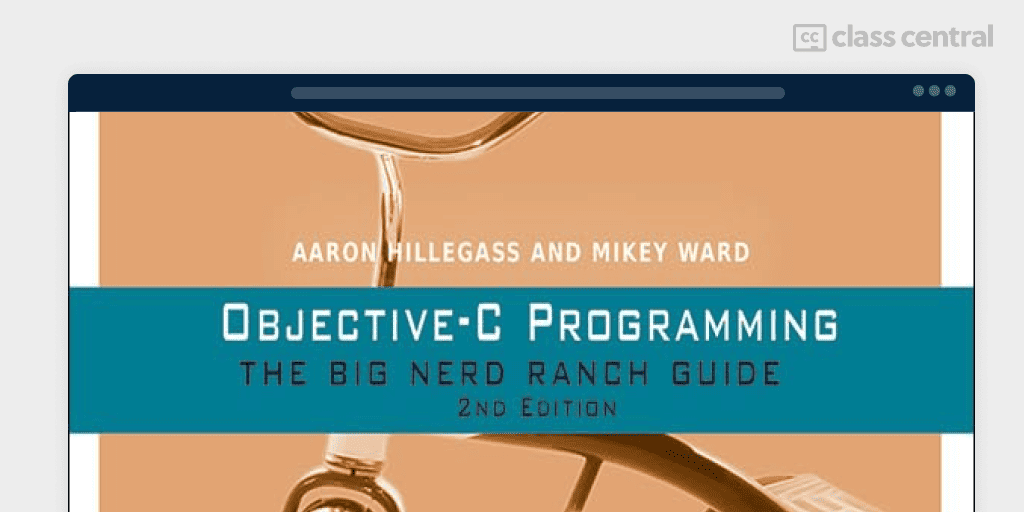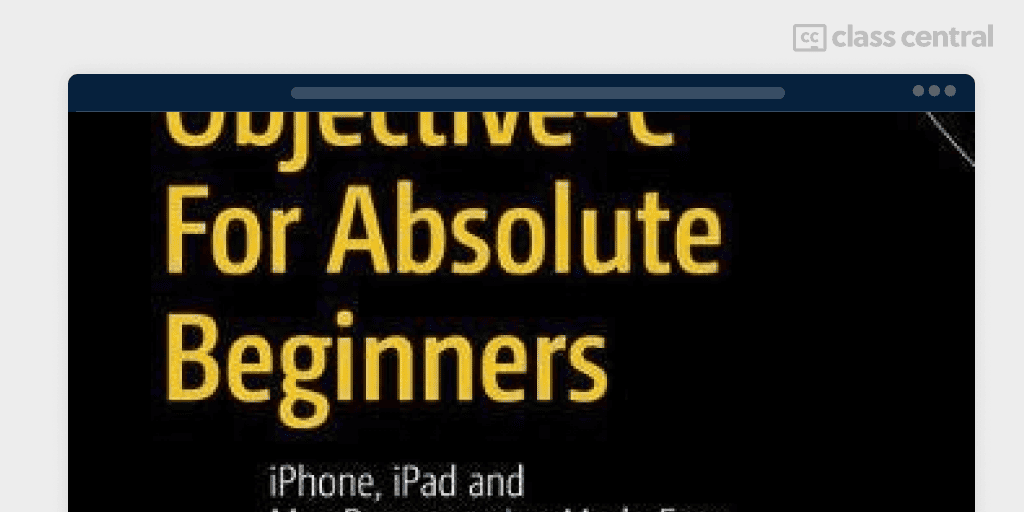8 Best Objective-C Courses for 2025: Elevate Your iOS Skill Set
Stand out from the Swift developer crowd with these free and paid courses on Objective-C.
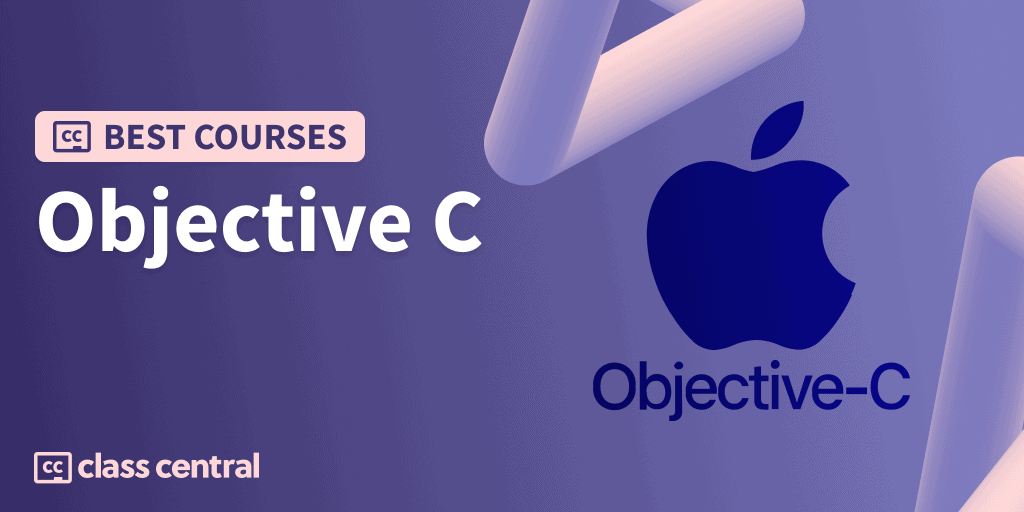
Need to learn Objective-C? I’ve got you covered.
In this Best Courses Guide, I’ve chosen the best Objective-C courses (including books) to get started with the language.
I’ve taken into consideration that developers who learn Objective-C in 2025 are likely to be familiar with Swift. Thus, half of these courses assume that you know Swift beforehand, some of them focusing on Objective-C and Swift interoperability.
If you need to learn Swift, take a look at our Best Swift Courses Guide.
However, even if you’re learning Objective-C for some other reason, like working with legacy Objective-C codebases, developing GUI desktop applications with GNUstep, or perhaps you like working on hobbyist projects such as developing for the Sega Dreamcast, I’ve also got the right Obj-C resources for you.
And while some of the courses may be dated, that doesn’t mean that they are outdated. Objective-C has been very stable since iOS 7, and many Objective-C devs are happy programming in it to this day, so any programming syntax or concepts you learn from resources made in the last decade will still remain relevant years later.
Click on the shortcuts for more details:
- Top Picks
- What is Objective-C?
- Why learn Objective-C?
- Courses Overview
- Why You Should Trust Us
- BCG Methodology
Here are my top picks. Click on one to skip to the course details:
What is Objective-C?
Objective-C is a general-purpose, object-oriented programming language that adds Smalltalk-style messaging to the C programming language, as well as dynamic typing and object-oriented programming. It’s a superset of C, which means that any valid C code will also compile in an Objective-C program.
It was the main programming language used by Apple for the macOS and iOS operating systems, and their respective APIs (Cocoa and Cocoa Touch) until the introduction of Swift in 2014.
Why learn Objective-C?
Many major established companies (especially FAANG) have released either one or more iOS or MacOS applications. More than likely, these companies rely on a huge codebase of legacy Objective-C code (Apple, in fact, still heavily relies on Objective-C, with over 61% of binaries using Objective-C in the latest version of iOS). There are three ways they can deal with this technical debt.
- Continue maintaining and developing in Objective-C
- Maintain the legacy Objective-C code but develop new features in Swift, relying on Swift’s interoperability
- Port over the legacy Objective-C code to Swift
In all of these cases, knowledge of Objective-C is needed to be a successful iOS developer. Even migrating Objective-C to Swift requires an understanding of Objective-C in the first place.
And while some companies may not expect Swift developers to know Objective-C before joining, and even give them a few weeks to learn the language, not all companies do. And with the current job market as competitive as it is, learning Objective-C may very well give you a big edge over other iOS/MacOS developers. According to Stack Overflow Developer Survey 2024, there are less than half as many Objective-C developers as there are Swift developers.
Courses Overview
- Three of the courses are free, while the rest are paid
- All of the courses here use Objective-C 2.0
- There have been no major changes to Objective-C since iOS 7, so don’t worry about learning outdated syntax — every course here uses iOS 7 or higher
- However, there have been several major changes with XCode’s layout, Apple’s IDE, as well as some frameworks that relied on Objective-C. So take note when working with outdated resources
- You won’t need to use an older version of XCode or anything like that though, since Apple continues to maintain XCode’s support for Objective-C code.
Best Paid Up-To-Date Course for Swift Developers (Pluralsight)
Are you a Swift developer? The best and latest course for someone of your experience is David Nutter’s Objective-C for Swift Developers.
This short, paid Pluralsight course will help you read, understand, and modify existing Objective-C codebases. By the end, you’ll have the foundational knowledge needed to seamlessly integrate Objective-C code into your Swift projects, be it for iOS, macOS, tvOS, or watchOS.
Through video lectures, slides, and XCode programming demos, you’ll learn:
- Dive into the basic syntax of the Objective-C language, including variable declarations, data types, control flow, etc.
- Explore the concept of objects, the id type, and namespaces
- Understand class interfaces, including properties, methods, and nullability
- Discover class implementation and the art of message sending
- Grasp the object lifecycle and memory management
- Work with collections, fast enumeration, and runtime type checking
- Extend the functionality of classes using categories and class extensions
- Implement protocols and delegates to establish communication between objects
- Utilize associative references to attach custom data to existing objects
- Harness the power of blocks for concise and expressive code
- Interoperate between Objective-C and Swift.
David Nutter is a long-time iOS developer, and previously worked at Apple as a Software Developer Engineer.
| Provider | Pluralsight |
| Instructor | David Nutter |
| Prerequisites | Swift experience |
| Workload | 1–2 hours |
| Rating | 4.5 / 5.0 (22) |
| Cost | Paid |
| Exercises | Code demos |
| Certificate | Paid |
Best Free Crash Course for Swift Developers (Brian Voong)
Obj-C Getting Started will jump start your Objective-C learning from a Swiftie perspective.
Step by step, you’ll learn hands-on by developing a basic single view (specifically, the UITableView) iOS app in Objective-C from scratch, including setting up the project, subclassing UI elements, and adding basic functionality. You’ll also compare differences between Swift and Objective-C. For example, that Properties in Objective-C require modifiers like strong, nonatomic and use of pointers with *.
Brian Voong is a professional instructor with 10+ years of experience. He runs the channel Lets Build That App where he builds working clones from the AppStore, such as YouTube and FaceBook.
| Channel | Lets Build That App |
| Provider | YouTube |
| Instructor | Brian Voong |
| Prerequisites | Swift experience |
| Workload | ≈20 mins |
| Enrollments | 53K |
| Likes | 922 |
| Cost | Free |
| Exercises | Code demo |
| Certificate | None |
Best Paid Up-To-Date Comprehensive Book for Swift Developers (HackingWithSwift)
Objective-C for Swift Developers is, in my opinion, the best and most complete resource on Objective-C coding.
This paid course was created by Paul Hudson. In the rare case you haven’t heard of him, he’s the person behind HackingWithSwift, an educational resource well-loved by many for all things Apple. You certainly won’t regret investing in this course, especially since it’s up-to-date with the current Swift 6, and will continue to be updated for future versions.
Here are some of the great things I love about this course:
- Comprehensive yet beginner-friendly:
- You’ll learn the complete Objective-C package, including pointers, blocks, protocols, and categories. No assumptions are made about your knowledge of languages other than Swift.
- Three hands-on projects:
- Paul Hudson emphasizes learning in context over isolated theory. Thus, everytime you learn a new concept, you’ll get to apply it in a project later. These projects are: a Hangman game, a Sci-Fi Quotes app, and a JSON parser.
- Walkthrough video demo:
- You’ll convert a complete app made in Swift to Objective-C. This means you can compare code to see how concepts translate.
By the end of this course, you’ll have the skills needed to work with any Objective-C code you may encounter in the wild.
| Institution | HackingWithSwift |
| Provider | Independent |
| Author | Paul Hudson |
| Prerequisites | Swift experience |
| Workload | <4 hours |
| Cost | Paid |
| Exercises | Projects & Exercises |
| Certificate | None |
Best Free Hands-On Course for Swift Developers (Udacity)
A free alternative to the premium Pluralsight Objective-C course is this free Udacity course that’s named similarly: Objective-C for Swift Developers.
This course is particularly useful for those who need to port a huge existing Objective-C codebase over to Swift. Luckily, you don’t have to rewrite the entire thing, thanks to Objective-C and Swift interoperability. You’ll learn how to do that with hands-on experience, as well as pick up real-world insights from Lyft’s and Venmo’s momentous rewrite of their iOS apps from video interviews with experts.
There are 5 modules in this course:
- Writing Classes in Objective-C: Familiarize yourself with Objective-C syntax. Write some classes and properties from scratch.
- Methods and Messages in Objective-C: Master how to write and call methods in Objective-C. Build a functioning game.
- Porting from Objective-C to Swift (Part 1): Write custom classes and incorporate third party frameworks and extensions. Multiple Objective-C apps will be given to be ported.
- Porting from Objective-C to Swift (Part 2): Persist data with NSCoder and NSKeyedArchiver. Implement navigation with a collection view.
- Common Interop Challenges: Facilitate communication between the languages of iOS, taking care of common problems such as null safety.
By the way, mixed together with programming lecture videos are fun skits. For example, the course concludes with a duet sung by personified Objective-C and Swift, where they detail their differences.
| Institution | Udacity |
| Provider | Udacity |
| Instructor | Gabrielle Miller-Messner |
| Prerequisites | Swift experience |
| Workload | 5 weeks |
| Cost | Free |
| Exercises | Code demos, coding quizzes |
| Certificate | None |
Best Free Exercise Provider for All Developers (Exercism)
So you’ve learned some Objective-C. What now?
Well, the most important thing any programmer should do after learning something new is putting what they’ve learned to practice. That’s where Exercism comes in.
This free online coding platform offers autograded coding exercises on 75 programming languages, including Objective-C. Additionally, all of these exercises are up-to-date.
The best part of Exercism is its mentoring system. After completing and submitting a solution, you can get an expert to review your code and point out places for improvement — all for free. I tried the system out when I was learning Clojure, so I can confirm it works.
Anyone can take the coding exercises, as they range in difficulty from easy, to medium, to hard. Interested? Read the starters guide to Exercism to get started.
| Provider | Exercism |
| Prerequisites | None |
| Workload | N/A |
| Enrollments | 2.2K |
| Contributors | 32 |
| Mentors | 72 |
| Cost | Free |
| Exercises | Autograded coding exercises |
| Certificate | None |
Best Paid Introductory Book for Programmers (Stephen Kochan)
This is the first of two books that Objective-C programmers swear by.
Dubbed as the book for Objective-C (similar to K&R was to C), this paid book focuses primarily on the Objective-C language itself. While it does cover some iOS 7 and macOS development concepts, that is not the main focus. Which isn’t a big problem anyways since the frameworks it uses may have changed.
Thus whether you’re a beginner or experienced programmer, you’ll find this to be a great resource and reference, especially if you dislike reading documentation.
Kochan’s Programming in Objective-C has three major chapter headings, and they are:
- The Objective-C Language:
- Basic syntax elements (variables, data types, operators, etc.)
- Control structures (if/else, loops, switch statements)
- Functions and methods
- Object-Oriented Programming (OOP) Concepts, including classes, inheritance, and polymorphism
- Underlying C Language features.
- The Foundation Framework:
- Building base layer of functionality for apps and frameworks
- Text processing
- Working with files
- Date and time calculations
- Memory management and Automatic Reference Counting (ARC).
- Cocoa, Cocoa Touch, and the iOS SDK
- Overview of the Cocoa and Cocoa Touch frameworks
- Commonly used classes and APIs
- Developing iOS applications using Objective-C.
(Note: the forum mentioned in the book no longer exists)
| Publisher | Addison-Wesley Professional |
| Author | Stephen G. Kochan |
| Prerequisites | None |
| Workload | N/A |
| Rating | 4.1/5.0 (120) |
| Cost | Paid |
| Exercises | Coding exercises |
| Certificate | None |
Also Great Paid Introductory Book for Programmers (Big Nerd Ranch)
Big Nerd Ranch’s Objective-C Programming (2nd edition) is the second of two books that Objective-C programmers swear by.
This paid book is a basic primer on C and Objective-C, especially if you don’t have much programming experience with low-level topics like pointers. It also covers how to use the Foundation framework for iOS 7, which provides a set of classes for common data types, collections, file management, networking, and more, including the Model-View-Controller pattern.
However, as this book is more than a decade old, some of the code examples (especially the advanced ones using Foundation Framework or XCode) probably don’t work. Still, it’s a good intro if you’re good at translating syntax.
| Publisher | Big Nerd Ranch Guides |
| Authors | Aaron Hillegass, Mikey Ward |
| Prerequisites | None |
| Workload | N/A |
| Rating | 4.5/5.0 (187) |
| Cost | Paid |
| Exercises | Coding challenges |
| Certificate | None |
Best Paid Introductory Book for Absolute Beginners (Stefan Kaczmarek)
Don’t have any programming knowledge whatsoever? Or have you programmed a long time ago and need a refresher on OOP and Logic? This paid book is for you.
Objective-C for Absolute Beginners will help beginners program in Objective-C for the iPhone, iPad, and Mac. To help ease the difficulty of learning full-fledged development tools and programming concepts , you’ll first use a 3D drag-and-drop programming environment called Alice. With Alice, you’ll learn Objective-Oriented Programming and logic concepts by building sophisticated apps. After that, you’ll use Apple’s XCode code editor to learn Objective-C programming syntax and apply your newfound knowledge here, without stumbling back and forth between practice and theory,
As this book is 5 years old, I highly recommend absolute beginners supplement this book with a more up-to-date resource, or better yet, a teacher.
(Note: the forum mentioned in the book no longer exists)
| Publisher | Apress |
| Authors | Stefan Kaczmarek, Brad Lees, Gary Bennett, Mitch Fisher |
| Prerequisites | None |
| Workload | N/A |
| Cost | Paid |
| Exercises | Code exercises |
| Certificate | None |
Why You Should Trust Us
Class Central, a Tripadvisor for online education, has helped 100 million learners find their next course. We’ve been combing through online education for more than a decade to aggregate a catalog of 250,000 online courses and 250,000 reviews written by our users. And we’re online learners ourselves: combined, the Class Central team has completed hundreds of online courses.
Best Courses Guide (BCG) Methodology
I built this ranking following the now tried-and-tested methodology used in previous BCGs (you can find them all here). It involves a three-step process:
- Research: I started by leveraging Class Central’s database and the internet. Then, I made a preliminary selection of 90 Objective-C courses and resources by rating, reviews, and bookmarks.
- Evaluate: I read through reviews on Class Central, Reddit, and course providers to understand what other learners thought about each resource and combined it with my own experience as a learner.
- Select: Well-made resources were picked if they presented valuable and engaging content, fit a set of criteria and be ranked according to comprehensive curriculum, affordability, release date, ratings and enrollments.
Pat revised the latest version of this article.



